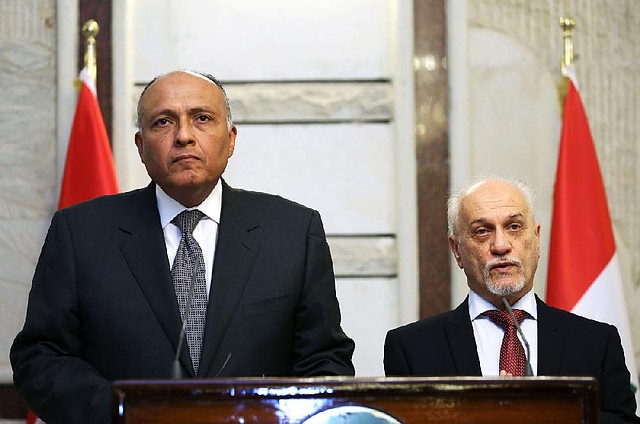Iraq Kurds seize 2 oil fields near Kirkuk
Hussain al-Shahristani, (right) Iraq’s energy minister, attends a news conference Friday with Egyptian Foreign Minister Sameh Shoukry in Baghdad. Al-Shahristani was appointed to replace a Kurd as interim foreign minister.
Saturday, July 12, 2014
BAGHDAD -- Kurdish security forces took over two major oil fields outside the disputed northern city of Kirkuk before dawn Friday and said they would use some of the production for domestic purposes, further widening a split with the central government of Prime Minister Nouri al-Maliki.
The Kurds have been fighting Sunni militants across the country's northern front. On Friday, a suicide bomber blew himself up at a checkpoint outside Kirkuk, killing 13 people and wounding 23, police and hospital officials said on condition of anonymity because they weren't authorized to brief the media.
The takeovers of the Bai Hassan and Kirkuk oil fields were the latest land grabs by Kurds, who have responded to the Sunni militant insurgency that has overrun large parts of Iraq by seizing territory of their own, effectively expanding the Kurdish autonomous zone in the north.
Kurdish fighters known as peshmerga pushed into Kirkuk, a major hub for the oil industry in the north, and the surrounding area weeks ago in the early days of the Sunni militant blitz. But until now they had not moved into the oil fields in the area. On Friday, however, the fighters took over the Bai Hassan and Kirkuk fields and expelled local workers, the Oil Ministry in Baghdad said.
Oil Ministry spokesman Assem Jihad denounced the move as "a violation to the constitution" and warned that it poses "a threat to national unity."
The Kurdish Regional Government said its forces moved to secure the fields after learning of what it said were orders by officials in the Oil Ministry to sabotage a pipeline linking oil facilities in the area. It said production would continue and that workers can return but will operate under Kurdish management.
Production from the fields will be used to fill the shortage of refined products in the domestic market, the regional government said, in a reference to a fuel crunch in the Kurdish region. It also said the Kurdish Regional Government will claim its "constitutional share" of revenue from the fields to compensate for Baghdad's cutting off the 17 percent of the state budget -- about $20 billion in this year's projected budget -- that is supposed to be given to the Kurdish region.
The central government withheld the funds after the Kurds began moving oil from fields inside the autonomous zone to Turkey independently and against Baghdad's wishes.
The Kurds have said their earlier moves into disputed lands were intended to protect the areas from Sunni militants after the collapse of the Iraqi military in the face of the insurgency over the past month. But the territory they seized has large Kurdish communities.
In the past few weeks, the president of the Kurdish zone has said the seized land won't be returned -- including the highly disputed Kirkuk -- and he called for Kurdish lawmakers to prepare to hold an independence referendum in the area, a move strongly opposed by the U.S. and Baghdad. Sunni Arabs and ethnic Turkmens who also claim Kirkuk have warned of a backlash if Kurds try to monopolize the oil in the region.
The Kurds and Baghdad have feuded for years over oil resources, disputed territory and a host of other issues. Yet, they have also found room for compromise, and the Kurds provided critical backing to help al-Maliki become prime minister.
But their ties are rapidly unraveling as the country fragments in the face of the Sunni militant blitz, led by the Islamic State of Iraq and the Levant. The country is being cleaved along ethnic and sectarian lines -- the swath of militant-held Sunni areas, the Shiite-majority south and center ruled by the Shiite-led government in Baghdad, and the Kurdish north.
In recent days, the political divisions between Baghdad and the Kurds have grown increasingly bitter. Al-Maliki on Wednesday accused the Kurds of harboring Sunni militants.
The Kurds responded by declaring that their politicians will boycott Cabinet meetings, renewing demands that al-Maliki step down.
On Friday, al-Maliki appointed temporary replacements for all five Kurdish ministers in his Cabinet, said Deputy Prime Minister Hussain al-Shahristani.
Al-Shahristani said he was appointed acting foreign minister to stand in for Hoshyar Zebari, who was one of the most prominent Kurds in the government and has been Iraq's top diplomat for more than a decade.
Also on Friday, Human Rights Watch said Iraqi security forces and government-affiliated militias appear to have killed at least 255 prisoners in six cities and villages since early June.
It said five of the mass killings took place as the security forces were fleeing the militants' advance and that many of the dead were Sunni. Most members of the security forces and militias are Shiite.
Information for this article was contributed by Qassim Abdul-Zahra, Ryan Lucas, Maamoun Youssef and Mariam Rizk of The Associated Press.
A Section on 07/12/2014

